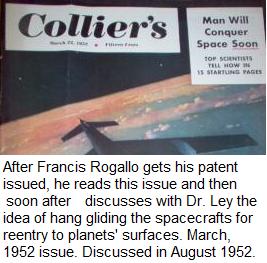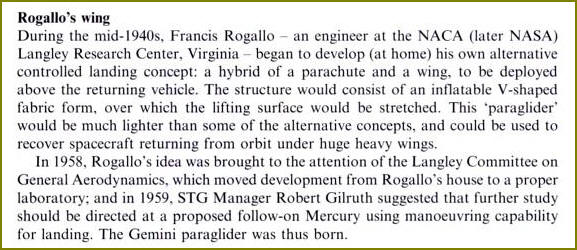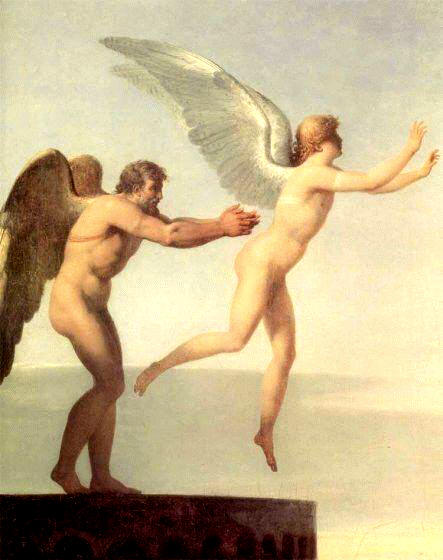|
1950 1951 1952 1953 1954 1955 1956 1957 1958 1959
Explore all of Horten to know some strong effects for hang gliders: Start:
Reimar Horten
Hang Glider History Timeline EnterData +
Send your favorite timed item to
timeline@hanggliderhistory.com
Notes: Link prefix with "g" is a generalized Google search.
Prefix with a "w" is a leading Wikipedia file on topic. |
Books and Art
Consider copy-paste one of these in the Keywords field:
-
hang glider
-
hang gliding
-
paragliding
-
ultralights
-
microlights
-
kites
-
kiting
|

FLEXIBLE KITE
William M. Allison
Dayton, Ohio: vertical-sparred-only single surface kite that would become confused with Frank Scott's later Scott Sled kite. The Allison "polymorphic kite" would adjust its semi-flexible sail relative to airspeed, gusts, and design; the first Allison kite had the the two vertical spars set non-parallel with the spars closer together at the tail edge of the kite; the Scott Sled primarily keeps the two spars parallel. Very many variations on the Allison and Scott "Sled" kite family pepper kite scenes. Perhaps the most practical use of the Allison kite or Scott sled kite is its use in basic kite classes for beginners because of its construction ease and ease of flying; this is an important application space for a kite type; it competes with the common diamond or Eddy kite for the first basic kite for youngsters. Enhancements to the basic Allison kite find their way in the hobbies of many kiters. Careful distinctions would keep one knowing that the Allison kite is not a sparred Rogallo wing (though this is debated), not a Barish sailwing, and not an unspared Rogallo parawing (though this is debated), not a KiteShip wing, and not a Jalbert Parafoil wing. Various spreaders, sail holes, inflation spars, etc. are part of the fun development of the Allison kite or Scott Sled kite. gWAk1 gSSk1 gIMGsWASS1
One recurring challenge for the Scott Sled is a slapping collapse of the wing under certain conditions. Though literature heavily notes Frank Scott, the actual inventor of the family of kites in focus goes to William M. Allison. But search "Scott Sled" or just "Sled" to reach most images.
Patent number: 2737360
Filing date: Sep 8, 1950
Issue date: Mar 1956
Inventor: William M. Allison

SELF-STIFFENED FLEXIBLE KITE
David M. Checkley One of the many follow-on patents includes a self-stiffened version: Patent number: 3860204 Filing date: May 11, 1973 Issue date: Jan 1975
|
1950
EnterData+
[_top_]
|
|
|
1951
EnterData+
[_top_] |
 Francis Rogallo would read a 1952 Collier's Magazine article about gliders used to return space vehicles; the illustrated gliders were above the payload; the payload was hanging beneath the rigid-winged glider---huge hang gliders for that era...non-foot-launched hang gliders. He discussed with others about the use of flexible wing devices for doing the same thing. In August of 1952, he discussed with Dr. Willy Ley, a Collier's consultant, the popping out of flexible wings to glide into planets surfaces. p. 383, History of NASA). Francis Rogallo would read a 1952 Collier's Magazine article about gliders used to return space vehicles; the illustrated gliders were above the payload; the payload was hanging beneath the rigid-winged glider---huge hang gliders for that era...non-foot-launched hang gliders. He discussed with others about the use of flexible wing devices for doing the same thing. In August of 1952, he discussed with Dr. Willy Ley, a Collier's consultant, the popping out of flexible wings to glide into planets surfaces. p. 383, History of NASA).
March 1952 issue of Collier's had the front page featuring an article's title: "Man Will Conquer Space Soon" Top Scientists will tell how in 15 startling pages" ...March, a kite month.... hang those babies beneath my Rogallo wings... Finally in 1958 after the Russians Sputnik orbited the earth in 1957, Francis Rogallo was permitted by NASA to run some wind-tunnel tests of boned Rogallo wings--a step toward a national hang glider; the flowering of his leadership trifurcated to parachutes, governable parachutes, powered Ryan vehicles, to Paresev hang gliders, and vehicles to train pilots for the proposed parawing re-entry concepts. As the challenge of unfurling Rogallo winged devices proved too great of a task and while alternative modes for re-entry presented themselves to scientists, lifting bodies took over the funds while the world of hang gliding took the byproduct goods! [Issues of that Collier's magazine are on sale in eBay.] |
1952
EnterData+
[_top_]
Rogallo reads
a
Collier's Magazine.
|
|
Another Rogallo patent (on his way to over 20+ patents involving the Rogallo wing...raw or embedded in stiffenings): Patent number: 2751172 Filing date: Nov 17, 1953
This patent was referenced later by
| 4892272 |
Kite-like flying device with dual handles and four point control |
Jan 9, 1990 |
| 5120006 |
Kite-like flying device with independent wing surface control |
Jun 9, 1992 |
| 5533694 |
Method for locating the resultant of wind effects on tethered aircraft |
Jul 9, 1996 |
| 6357697 |
Kite structure |
Mar 19, 2002 |
| 6640483 |
Lightweight bird decoy apparatus |
Nov 4, 2003 |
| 7093803 |
Apparatus and method for aerodynamic wing |
|
1953
EnterData+
[_top_]
|
- Send facts: faust@hanggliderhistory.com JF1 JF2 gJF
- 1953/1954 cover of Air Progress magazine or collection featured biplane hang glider art.
- Powered gondola beneath a Kiernan inflated wing...flying
-
|
1954
EnterData+
[_top_]
|
- Gyro glider. Glide via autorotation of generally horizontally rotating wings. Power launch and then shut off engine and glide or soar. [gyro, gyroglider, gyro hang glider, gyro soarer, gyrocopter, gyrocoptering, rotating wing hang glider] See 1920 for a patent.
- There is a public media claim of a 1955 Rogallo wing hang glider being flown. John Bentley brought the matter up; the verification of this has not been solved yet.
|
1955
EnterData+
[_top_]
|
- Inflatoplane, Goodyear. Wing technology fit for hang gliders? Fit for PGs for anti-deflating?
- Allison's patent was approved on March 6th 1956
|
1956
EnterData+
[_top_]
|
- Sputnik 1, Oct. 4, 1957. (Poynter
would publish 1958) This event would affect hang
gliding.

[ ] Langley Committee on General Aerodynamics.
[ ] Robert Gilruth
GilruthAndRogallo
|
1957 |
- There is a claim by Dick Cheney of having flown a Rogallo hang glider in 1958. Data is invited.EnterData+
- U.S.A.: "We need a national hang glider in order to compete with the Russians! Let's talk more carefully with Francis Rogallo; he seems to have something for us."
- Francis Rogallo is given permission to test three-boom two-lobe stiffened Rogallo wing in NASA wind tunnel
- Fifteen-year-old class world record body-flight: 6' 8 1/4" over barrier with some positive lift from body-shaping from foot-launch to sky, achieved at the Occidental College SPAAU competition. Helms Hall of Fame Athlete of the Week award. Short flight. Summer. Two years later he would make a spot on the USA Olympic Team.
|
1958
EnterData+
[_top_] |
- http://www.ffvl.fr/Vol_Libre/Historique/historique.html
-
Hi Joe, (June 29, 2012 note)
Thanks for keeping me in the loop. I'm sorry to hear of Dr. Lissaman's passing.
I was honored to have him write the Foreword to Jack Lambie's 2nd edition of his
2nd book with us, Composite
Construction for Homebuilt Aircraft.
Jack's first book for us is Ultralight
Airmanship, while Designing and Building Composite R/C Model Aircraft was
his third for us. He was working on an update of the model book when he was
tragically murdered by his drunken brother. That really hurt. UL Airmanship and
the Composite book are still in print. ( www.aeronauticalpublishers.com)
If you haven't done so, be sure to visit the "About Us" page and explore the
links and scroll down too.
The story behind the story is that I first learned about Jack, and was inspired
by his writing in the first issue of Model Airplane News I ever read
(June 1959, I have that issue),
when I was 12. It inspired my dream of writing. Jack's article was titled, "Why
Not a Sailplane?" and a homebuilt aircraft (the Salvay-Stark Skyhopper) was
featured on the cover with a story about the EAA inside...inspiring another
dream. A few years later I read of Jack's "Hang Loose."
Lift,
Mike |
1959
EnterData+
[_top_]
|

 Francis Rogallo would read a 1952 Collier's Magazine article about gliders used to return space vehicles; the illustrated gliders were above the payload; the payload was hanging beneath the rigid-winged glider---huge hang gliders for that era...non-foot-launched hang gliders. He discussed with others about the use of flexible wing devices for doing the same thing. In August of 1952, he discussed with Dr. Willy Ley, a Collier's consultant, the popping out of flexible wings to glide into planets surfaces. p. 383, History of NASA).
Francis Rogallo would read a 1952 Collier's Magazine article about gliders used to return space vehicles; the illustrated gliders were above the payload; the payload was hanging beneath the rigid-winged glider---huge hang gliders for that era...non-foot-launched hang gliders. He discussed with others about the use of flexible wing devices for doing the same thing. In August of 1952, he discussed with Dr. Willy Ley, a Collier's consultant, the popping out of flexible wings to glide into planets surfaces. p. 383, History of NASA). 